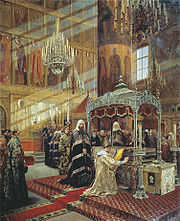
Glorification
Encyclopedia
Catholicism
For the process by which the Roman Catholic ChurchRoman Catholic Church
The Catholic Church, also known as the Roman Catholic Church, is the world's largest Christian church, with over a billion members. Led by the Pope, it defines its mission as spreading the gospel of Jesus Christ, administering the sacraments and exercising charity...
or Anglican Communion
Anglican Communion
The Anglican Communion is an international association of national and regional Anglican churches in full communion with the Church of England and specifically with its principal primate, the Archbishop of Canterbury...
grants official recognition to someone as a saint
Saint
A saint is a holy person. In various religions, saints are people who are believed to have exceptional holiness.In Christian usage, "saint" refers to any believer who is "in Christ", and in whom Christ dwells, whether in heaven or in earth...
, see canonization
Canonization
Canonization is the act by which a Christian church declares a deceased person to be a saint, upon which declaration the person is included in the canon, or list, of recognized saints. Originally, individuals were recognized as saints without any formal process...
.
Eastern Orthodox Church

Eastern Orthodox Church
The Orthodox Church, officially called the Orthodox Catholic Church and commonly referred to as the Eastern Orthodox Church, is the second largest Christian denomination in the world, with an estimated 300 million adherents mainly in the countries of Belarus, Bulgaria, Cyprus, Georgia, Greece,...
for the official recognition of a person as a saint
Saint
A saint is a holy person. In various religions, saints are people who are believed to have exceptional holiness.In Christian usage, "saint" refers to any believer who is "in Christ", and in whom Christ dwells, whether in heaven or in earth...
of the Church. The Orthodox Christian term theosis
Theosis
In Christian theology, divinization, deification, making divine or theosis is the transforming effect of divine grace. This concept of salvation is historical and fundamental for Christian understanding that is prominent in the Eastern Orthodox Church and also in the Catholic Church, and is a...
is roughly equivalent to the theological term "glorification" used by Protestants. The Glorification of saints, as in the Catholic Church, is considered to be an act of God, not a declaration of the hierarchy. The official recognition of saints grows from the consensus of the church.
When an individual who has been sanctified by the grace of the Holy Spirit
Holy Spirit
Holy Spirit is a term introduced in English translations of the Hebrew Bible, but understood differently in the main Abrahamic religions.While the general concept of a "Spirit" that permeates the cosmos has been used in various religions Holy Spirit is a term introduced in English translations of...
falls asleep in the Lord, God may or may not choose to glorify the individual through the manifestation of miracle
Miracle
A miracle often denotes an event attributed to divine intervention. Alternatively, it may be an event attributed to a miracle worker, saint, or religious leader. A miracle is sometimes thought of as a perceptible interruption of the laws of nature. Others suggest that a god may work with the laws...
s. If He does, the devotion to the saint will normally grow from the "grass roots" level. Eventually, as the Holy Spirit manifests more miracles, the devotion to the individual grows. At this point there are no formal prayers by the Church to the individual. Rather, memorial services (Greek: Parastas, Russian: Panikhida) are served at the grave of the individual, praying for him or her—though an individual may pray privately to someone who has not yet been formally Glorified, and even commission Icons, which may be kept in the home but not displayed in the Temple (church building).
Eventually, the evidence of their saintliness will have grown to such a degree that a formal Service of Glorification will be scheduled. A Glorification may be performed by any Bishop
Bishop
A bishop is an ordained or consecrated member of the Christian clergy who is generally entrusted with a position of authority and oversight. Within the Catholic Church, Eastern Orthodox, Oriental Orthodox Churches, in the Assyrian Church of the East, in the Independent Catholic Churches, and in the...
within his Diocese
Diocese
A diocese is the district or see under the supervision of a bishop. It is divided into parishes.An archdiocese is more significant than a diocese. An archdiocese is presided over by an archbishop whose see may have or had importance due to size or historical significance...
, though such services are usually performed under the auspices of a Synod
Synod
A synod historically is a council of a church, usually convened to decide an issue of doctrine, administration or application. In modern usage, the word often refers to the governing body of a particular church, whether its members are meeting or not...
of Bishops. Often there will be a formal investigation to be sure that the individual is Orthodox in their faith, has led a life worthy of emulation, and that the reports of miracles attributed to their intercessions are verifiable. The Glorification service does not "make" the individual a saint; rather, the Church is simply making a formal acknowledgement of what God has already manifested.

Incorruptibility
Incorruptibility is a Roman Catholic and Eastern Orthodox belief that supernatural intervention allows some human bodies to avoid the normal process of decomposition after death as a sign of their holiness...
, meaning that their remains do not decay under conditions when they normally would (natural mummification
Mummy
A mummy is a body, human or animal, whose skin and organs have been preserved by either intentional or incidental exposure to chemicals, extreme coldness , very low humidity, or lack of air when bodies are submerged in bogs, so that the recovered body will not decay further if kept in cool and dry...
is not the same as incorruption). Sometimes even when the flesh does decay the bones themselves will manifest signs of sanctity. They may be honey colored or give off a sweet aroma
Odour of Sanctity
The odour of sanctity or odor of sanctity, according to the Catholic Church, is commonly understood to mean a specific scent that emanates from the bodies of saints, especially from the wounds of stigmata.-Meanings:...
. Some relics will exude myrrh
Myrrh
Myrrh is the aromatic oleoresin of a number of small, thorny tree species of the genus Commiphora, which grow in dry, stony soil. An oleoresin is a natural blend of an essential oil and a resin. Myrrh resin is a natural gum....
. The absence of such manifestations is not necessarily a sign that the person is not a Saint.
In some traditions, an individual who is being considered for Glorification will be referred to as "Blessed," though there is no formal service of "beatification" in the Orthodox Church. Some fully glorified saints are also referred to as "Blessed," such as a Holy Fool for Christ (for instance, "Blessed St. Xenia
Xenia of Saint Petersburg
Saint Blessed Xenia of St. Petersburg is a patron saint of St...
") or saints who have been given this particular appellation (such as, "Blessed Augustine
Augustine of Hippo
Augustine of Hippo , also known as Augustine, St. Augustine, St. Austin, St. Augoustinos, Blessed Augustine, or St. Augustine the Blessed, was Bishop of Hippo Regius . He was a Latin-speaking philosopher and theologian who lived in the Roman Africa Province...
", "Blessed Jerome
Saint Jerome
Saint Jerome is a Christian church father, best known for translating the Bible into Latin.Saint Jerome may also refer to:*Jerome of Pavia , Bishop of Pavia...
", and others). In such cases the title "Blessed" is in no way intended to imply that they are less than fully saints of the Church.
The particulars of the Service of Glorification may differ from jurisdiction to jurisdiction, but normally it involves the formal inscribing of the individual's name into the Calendar of Saints
Calendar of saints
The calendar of saints is a traditional Christian method of organizing a liturgical year by associating each day with one or more saints and referring to the feast day of said saint...
(assigning a special day of the year on which their feast day is to be celebrated annually), the chanting of a service in honor of the Saint (normally using specially commissioned hymns which are chanted for the first time at the Glorification) and the unveiling of an Icon
Icon
An icon is a religious work of art, most commonly a painting, from Eastern Christianity and in certain Eastern Catholic churches...
of the new Saint. Before the Glorification itself, there may be a special "Last Panikhida", a solemn Requiem at which, for the last time, the Church prays for the repose of their soul. After the Glorification, the Church will no longer serve a Panikhida
Memorial service (Orthodox)
A memorial service is a liturgical observance in honor of the departed which is served in the Eastern Orthodox and Greek-Catholic Churches.-The service:In the Eastern Church, the various prayers for the departed have as their purpose: to pray for the repose...
for the repose of his soul, but instead a Paraklesis
Paraklesis
A Paraklesis or Supplicatory Canon in the Orthodox Christian Church and Eastern Catholic Churches, is a service of supplication for the welfare of the living...
or Moleben
Moleben
A molében , also called a molieben, service of intercession, or service of supplication, is a supplicatory prayer service used within the Orthodox Christian Church and various Eastern Catholic Churches in honor of Jesus Christ, the Mother of God, a Feast, or a particular saint or martyr.The Moleben...
will be served to implore their intercessions before the Throne of God.
Martyr
Martyr
A martyr is somebody who suffers persecution and death for refusing to renounce, or accept, a belief or cause, usually religious.-Meaning:...
s need no formal Glorification. The witness of their self-sacrifice is sufficient (provided their martyrdom was the result of their faith, and there being no evidence of un-Christian behaviour on their part at the time of their death). Not all saints are known, many will remain hidden by God until the Second Coming
Second Coming
In Christian doctrine, the Second Coming of Christ, the Second Advent, or the Parousia, is the anticipated return of Jesus Christ from Heaven, where he sits at the Right Hand of God, to Earth. This prophecy is found in the canonical gospels and in most Christian and Islamic eschatologies...
of Christ. For this reason, on the Sunday after Pentecost
Pentecost
Pentecost is a prominent feast in the calendar of Ancient Israel celebrating the giving of the Law on Sinai, and also later in the Christian liturgical year commemorating the descent of the Holy Spirit upon the disciples of Christ after the Resurrection of Jesus...
the Orthodox celebrate all the righteous souls together on All Saints Sunday. In some jurisdictions, the Sunday following All Saints Sunday will be a day of general commemoration of all saints (known and unknown) of the local church. For instance, All Saints of the Holy Mountain
Mount Athos
Mount Athos is a mountain and peninsula in Macedonia, Greece. A World Heritage Site, it is home to 20 Eastern Orthodox monasteries and forms a self-governed monastic state within the sovereignty of the Hellenic Republic. Spiritually, Mount Athos comes under the direct jurisdiction of the...
, All Saints of Russia
Russia
Russia or , officially known as both Russia and the Russian Federation , is a country in northern Eurasia. It is a federal semi-presidential republic, comprising 83 federal subjects...
, All Saints of America, etc.
St. Symeon the New Theologian
Symeon the New Theologian
Symeon the New Theologian was a Byzantine Christian monk and poet who was the last of three saints canonized by the Eastern Orthodox church and given the title of "Theologian"...
writes: "The saints in each generation, joined to those who have gone before, and filled like them with light, become a golden chain, in which each saint is a separate link, united to the next by faith, works, and love. So in the One God they form a single chain which cannot quickly be broken."
Protestantism
There are two events that occur during glorification, these are "the receiving of perfection by the elect before entering into the kingdom of heaven," and "the receiving of the resurrection bodies by the elect"Glorification is the third stage of Christian development. The first being justification
Justification (theology)
Rising out of the Protestant Reformation, Justification is the chief article of faith describing God's act of declaring or making a sinner righteous through Christ's atoning sacrifice....
, then sanctification
Sanctification
Sanctity is an ancient concept widespread among religions, a property of a thing or person sacred or set apart within the religion, from totem poles through temple vessels to days of the week, to a human believer who achieves this state. Sanctification is the act or process of acquiring sanctity,...
, and finally glorification. (Rom. 8:28-30) Glorification is the completion, the consummation, the perfection, the full realization of salvation
Salvation
Within religion salvation is the phenomenon of being saved from the undesirable condition of bondage or suffering experienced by the psyche or soul that has arisen as a result of unskillful or immoral actions generically referred to as sins. Salvation may also be called "deliverance" or...
.
Glorification as a term is modified by its target, aka, who is being glorified, God or the Christian? The third stage of Christian development is to glorify God through one's life, to decrease so that He may increase so that as others encounter a living breathing Christian who is walking in Glorification, they encounter Christ and perceive His Glory and His presence. This is attainable while living, just as justification and sanctification are attainable while living.
Receiving of perfection
Glorification is the Protestant alternative to PurgatoryPurgatory
Purgatory is the condition or process of purification or temporary punishment in which, it is believed, the souls of those who die in a state of grace are made ready for Heaven...
, as it is "the means by which the elect receive perfection before entering into the kingdom of Heaven." According to the theologies of most major Protestant groups, Purgatory is a doctrine of the Catholic Church, a holding place for those whose lives were dominated by venial sin
Venial sin
According to Roman Catholicism, a venial sin is a lesser sin that does not result in a complete separation from God and eternal damnation in Hell...
s but not guilty of mortal sin
Mortal sin
Mortal sins are in the theology of some, but not all Christian denominations wrongful acts that condemn a person to Hell after death. These sins are considered "mortal" because they constitute a rupture in a person's link to God's saving grace: the person's soul becomes "dead", not merely weakened...
s. On the other hand, to Protestants, glorification is a continuous, flowing process, whereby believers in Jesus the Christ, who have either died or who are raptured alive (called up into heaven), receive glorified, perfect bodies and souls, sinless and Christlike. Those still living on earth have no effect on the outcome of those believers who have died or are raptured, nor do they have an effect on those who die without Christ.
While purgatory deals with the means by which the elect become perfect, Glorification deals with believers in Jesus being given perfection. The majority of Protestant denominations believe in this concept of glorification or something analgous to it, although some have alternative names for it.
Receiving of the resurrection bodies
After the final judgement, all the righteous dead shall arise and their bodies will be perfected and will become a glorified body. Only then can they enter heavenHeaven
Heaven, the Heavens or Seven Heavens, is a common religious cosmological or metaphysical term for the physical or transcendent place from which heavenly beings originate, are enthroned or inhabit...
. To paraphrase C. S. Lewis
C. S. Lewis
Clive Staples Lewis , commonly referred to as C. S. Lewis and known to his friends and family as "Jack", was a novelist, academic, medievalist, literary critic, essayist, lay theologian and Christian apologist from Belfast, Ireland...
's Weight of Glory: "If we were to see them in their glorified forms we would be tempted to bow down and worship them."
Orthodox Christianity
- The Glorification of Saints in the Orthodox Church by Fr. Joseph Frawley
- The Glorification of Saints by Protopresbyter Michael Pomazansky
- What Does Glorification Mean? by Fr. Alexey Young
- Eastern Orthodoxy and Theosis
Receiving of Perfection
- http://www.abideinchrist.com/keys/sanctification-perfect.html
- http://www.sdanet.org/atissue/books/wws/salv17.htm
Receiving of the resurrection bodies
- http://www.1way2god.net/glorification.html

